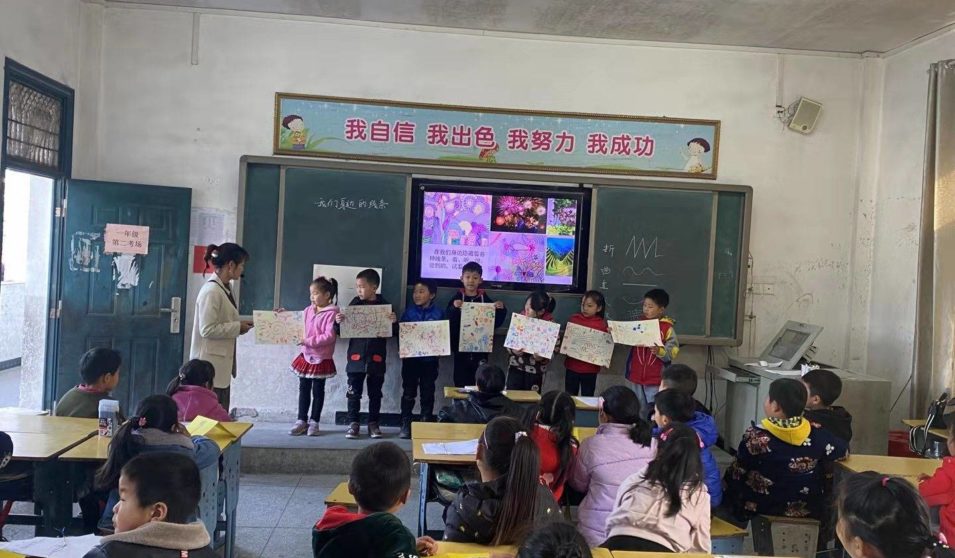Rural Schools Collaborative’s mission and work have always advocated on behalf of rural schools across the United States, but in recent years we have expanded our reach across the globe, including through programs such as Rural Educators Across Borders. In light of this new work, we had the opportunity to meet with Karen Yu, a former teacher in rural China, to talk about her own experience and the rural education system at large.
Karen got involved in teaching after realizing she didn’t enjoy her current job at an internet company: “I came across an advertisement about a program I could take part in that was a rural teacher program (希望乡村教师计划). So, I just signed up and I went to be a rural teacher for a year! I thought that it was so meaningful to teach students in a rural area.”
The school Karen taught in is in a village in the southern part of China, outside Chaozhou in Guangdong Province. She describes the village as having an overall positive atmosphere:
“There is a river that runs through it and lots of farms along the road, and a few factories there. Many villages around there rely on manufacturing something, but in this village they sell some ceramics because ceramics is one of the most important economic sources in Chaozhou. The pollution in that village is not very serious, so the environment is very good.”

The school had around 130 total students from ages 6 to 12, and about 20 students in each class - less than half of the expected class size in an urban school. Karen taught Mandarin, English, and Chinese geography, which she explains is more about Chinese culture than “literally geography.”
She also shared about the way teachers have traditionally taught in Chinese schools, and how that has changed since she was in school herself:
“Presentation, Practice, Production. It’s a traditional way of learning, and many teachers use that way when they teach students. The teacher will introduce something to the students, like if I was teaching English I would introduce some vocabulary or some phrases or some grammar, and then they can do some practice, like graphing in vocabulary, and then the teachers will walk around and invite some of the students to show their answer or present what they think about this practice and what they just learned. It all depends on the teacher. Older teachers in the rural school, or in my own school, taught in a very traditional way - the PPP way. However young teachers, like me and my colleagues of my age, try to introduce new methods.”
Some of these “new methods” included connecting students to local history, and giving them opportunities to explore personal interests and Chinese culture on their own. In particular, Karen explained that poetry is a fun activity to share with her students:
“I think my favorite was to teach them some Chinese culture, like ancient poems, 古诗 (gushi). Some older teachers don’t treasure this kind of knowledge, they just want them to get high marks on the exams, but in my opinion, and those of colleagues my age, we think that to learn about our local history and to tell our own stories is very important. My colleagues and I would organize some activities that encouraged students to share ancient poetry, to share some 古诗 with us. Some top students and others would share their most favorite poems with us, tell us why they loved it, and recite them. Then, we would give them a stamp, and if they collected enough stamps we would give them some gifts. I think that is another reason why they want to share this kind of poetry. And in our school, we also choose some students who are very engaged in these kinds of activities and teach them how to perform on stage so they can recite some poetry, and not just ancient poetry but modern poetry too, and would enter in competition with other schools in the town. I think that is a very meaningful activity for them.”
Although she did not always agree with how students were traditionally taught in other classrooms, Karen appreciated the differences as a chance to learn from her colleagues:
“I learned a lot of things, like student management. Although we want to encourage the students, we also need to know how to manage them, especially keeping them safe. So I needed to learn a lot from them. [As] for their teaching experience [sic, model], I disagreed with it, but it’s ok because teachers in that rural school can have their own styles. We worked well and we could share our teaching experiences with each other, even if we could not agree with each other. I don’t think we need to follow the traditional or old way of teaching; we can bring some new things to rural areas. That is the value of this program. Otherwise, we are just workers, not teachers.”
Considering the changes that happened in her own school, Karen also shares that broader preconceived notions about Chinese students and their education aren’t necessarily true.
“I think that there’s consensus that the Chinese system seems to be rigid and conservative. However, based on [my] own learning and teaching experience, the Chinese educational institutions emphasize both academic achievement and the students’ all-around development. Many Chinese students study very hard, but at the same time they’ll attend many activities to develop all kinds of other skills. I think we need to reverse the stereotypes toward the Chinese students.”
However, there is still a lot of pressure for students to pursue higher education, a sentiment that persists around the world:
“Most of the students want to go to college and university. Our careers require qualifications, and to get those you have to go to a college or university to get a better job. Even now, if we study at a college or university, it’s a little hard to find a good job so we need to do a masters degree. I think the situation is getting competitive, really competitive.”
Similar to teachers we’ve spoken with in the United States, a rural setting can pose a challenge when it comes to opportunities for real-world learning. Karen explains that field trips and community service are key experiences for students to broaden their perspectives:
“Urban students have a lot of opportunities to learn not just at school but also at home and in society. However, for rural students, although they can follow the teachers’ instruction at school and they work really hard, there are a lack of opportunities for them to learn at home because their parents can’t spend money on their learning, or they don’t have much time to accompany students.
Nevertheless, more rural areas in China are beginning to benefit from the rapid economic development that has already swept much of the country’s urban centers. The first among these advances being internet and transportation access, which open students to the wider world but also invite more immersive opportunities to explore their place:
Because of the growth of the internet and transportation, the parents, students, and family can get more economic resources and can spend more money to learn…In the computer rooms, the kids each have a computer to use and there are also the 5G towers in the village. The school and institutions themselves can also get funding from the government so they can organize more activities, like trips to museums in Chaozhou to learn more about the famous people or history in the area. I think the students can benefit a lot from this. They’ll also arrange trips to the mountains. We can also let them watch online movies to help them learn the culture or English. In some special festivals, the teachers will lead the students around the village to help others, to protect the environment and pick up rubbish. I think it’s a really good way to have them help society.”
Another shared issue is the wage gap between rural and urban teachers, causing a teacher shortage in rural areas. However, dedicated programs to recruit inspired teachers to serve in rural areas, like the one Karen joined, are helping:
“If teachers want to get a high salary, they tend to choose to work in an urban city. In the rural school they get a lower salary. However, in many kinds of programs they recruit volunteers to many different areas to teach in rural schools. These volunteer teachers can get other kinds of benefits, not just salary, like qualifications. After this program they can get an award from the government, not monetary but qualifications, so that their careers can be improved. Although some rural areas lack teachers, they can recruit many people through these programs.”
Despite these challenges, Karen shares how teaching in a rural area afforded her students unique educational experiences by being able to engage with them more personally. One favorite memory is when the teachers in the school collaborated to put on a fun event for the students, which helped engage them in learning:
“Because I taught English with my colleagues, we organized some sort of Harry Potter race. We divided the students into the four [houses], but no one wanted to be in Slytherin so we just forgot it and arranged them into three groups. We also had a headmaster and competition, so at the end of the year we could award who was the best team, who was the best house. They were very engaged in this competition. I think that is why we want to teach in a rural area. Before that, they may not have known about that, but I think if we can go even a little of this, they can change for a year or they can even form their [lifelong] habits of learning. I think that’s a very good way for teachers to work in a rural area.”
Beyond the classroom, Karen felt that the school and teachers were hugely involved in the life of the village:
“I think teachers could have that function [as community leaders] because the school needs to support the development of the village. The school can get a lot of funding from the government, so the government can advise the school to do some activities that will work with parents and the community. [For example], they will award some students who might be poor. They [schools] can also connect some companies and some programs, like the program I joined in, it’s a social group that’s approved by the government, so I think that’s another way they’re community leaders. I think the situation depends on the teachers. But the school, generally speaking, can perform this function; they can facilitate children’s learning.”

Genuine and honest conversations about rural education are often plagued with deep stereotypes, this is especially so when considering rural areas from disparate places around the world. So, when asked what message she would like to leave with readers, Karen explained that educating oneself about the world is crucial to becoming a good teacher and community leader:
“You can learn more about rural education and learn more about rural China. I think we need to break stereotypes about rural education and rural China. That is why I accepted this interview; I think it is a very good way to show the true situation in rural China. My personal hope is just to be a good teacher in the future. Maybe I’ll work toward being a community leader. I think that means a lot.”
We are grateful to Karen for sharing her story with us about her experience as a teacher in rural China. If you would like to share 30 minutes of your time for an interview, please reach out to us at info@ruralschoolscollaborative.org. The I Am A Rural Teacher campaign is a collaborative effort with the National Rural Education Association and made possible through a grant from the Bill & Melinda Gates Foundation.




